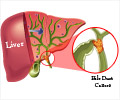
Chariya Hahnvajanawong and her colleagues of the Khon Kaen University and Mahidol University found that the four caged xanthones can significantly inhibit the growth of CCA cell lines by modulating the expression of apoptotic-regulated genes and proteins.This is the first report which shows that these compounds induce apoptosis by increasing the levels of proteins which promote apoptosis (Bax, apoptosis-inducing factor (AIF), activated caspase-9 and -3) while decreasing the levels of proteins which inhibit apoptosis (Bcl-2 and survivin).In the view of the authors, the chemical structure diversity of the four compounds reflects the biological activities. At the molecular level, isomorellinol exhibited the highest potential, indicating that functional groups on the prenyl side chain may be important.It is premature to conclude what the definite structure-activity relationship may be, but this preliminary insight provides a basis for further medicinal chemistry studies. Based on these results, the authors suggest that these four caged xanthones are compounds with great promise and may serve as a potential source and lead-structure for the development of a drug for the treatment of CCA.
Source-Eurekalert
RAS










